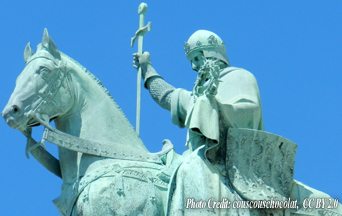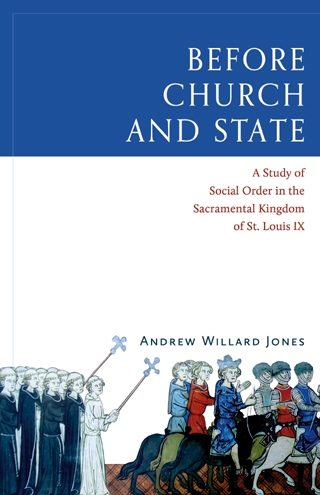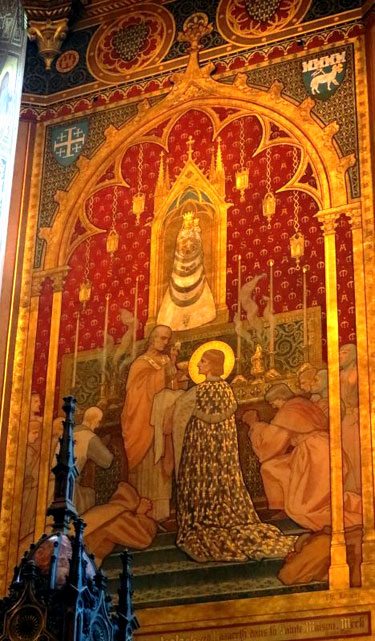
Many believe that Christendom was a rigid and brutal order. In medieval times, we are told that tyranny ruled, and the Church and the nascent State were constant rivals in the pursuit of dominance. So many modern historians have cynically reduced this period when Christianity prevailed to a time of cultural darkness and violent power struggles.
Such people fail to understand the Christian order since they equate it with tyranny. They judge Christendom from the premises of our present disorders, in which people only seek their self-interest.
That is why it is refreshing to find a modern scholar who can refute this utterly distorted narrative of the Christian order. Historian Dr. Andrew Willard Jones manages to break through the misconceptions and presents a fascinating look at the medieval order in his new book titled, Before Church and State: A Study of Social Order in the Sacramental Kingdom of St. Louis IX.
Learn All About the Prophecies of Our Lady of Good Success About Our Times
Describing a Flexible Organic Order
Prof. Jones does not run away from the unjust charges against the Christian order. Indeed, he affirms that people in the Middle Ages had a passion for order. He would not dispute the modern history books that feature charts of this seemingly rigid hierarchical order in which we find kings and nobles, a pope and bishops, merchants and peasants, all outlined very neatly on a page. However, in his new book, Prof. Jones takes those neat well-structured charts and scribbles all over them. He draws lines here and there, making all sorts of substitutions, connections and interconnections between people and nobles, bishops and kings, paupers and clerics. We are introduced to an amazing world of rights, customs, laws and grace that melded everyone in a particular kingdom into a people.
The modern chart is still there, but it is not a neat outline anymore. It is not a mechanical model of society like some corporate organizational chart. Rather, the Christian order takes on the appearance of something very organic and human. Its structures of Church and State, for example, might be likened to a presentation of soul and body. We know the two are distinct in theory, but when mixed together in practice, the chart gets messy.
Using the Wrong Criteria
That is the problem with those who criticize Christendom. They look rigidly upon the past with modern mechanistic criteria. They cannot think outside our Enlightenment box. Hence, they accuse anyone who thinks otherwise of idealizing the past.
Dr. Jones is far from idealizing the medieval past, but he does present a vision of Christendom beyond the oversimplified charts that box in our vision. We get a glimpse of the real Christian order. When properly understood, this Christian order is very appealing and refreshing.
From a Privileged Perspective
The author is the director of the Saint Paul Center at the Franciscan University of Steubenville. He spent ten years writing his book with the encouragement of colleagues. His studies took him into several disciplines which are presented in the book. His views are not just idle speculation about the past as he relies upon a wealth of primary sources that give delightful insight into the everyday lives of medieval Frenchmen.
Dr. Jones describes the Christian order by following the narrative of the reign of Saint Louis IX and his counselor Gui Foucois. The Frenchman Foucois was successively father, widower, judge, advocate, enqueteur, priest, bishop, cardinal and eventually Pope Clement IV. He straddled both sides of the religious and temporal order, often simultaneously.
From this privileged perspective, Dr. Jones constructs a vision of how medieval society worked. Instead of tyranny, we find subsidiarity. There is an order wonderfully adjusted to the needs of society. We witness a harmony and peace that cannot be understood, but is nevertheless so desperately needed by our fragmented, postmodern world that has separated what should be united, and made everything relative, deconstructed and uncertain.

A Coherent Vision of the Whole
Our historian’s central thesis is simply stated: “I argue that thirteenth century France was not a world of the secular and religious vying for position and power, but a world in which the material and the spiritual were totally dependent on each other and penetrated one another at every level.”
He claims medieval society offered “a coherent vision of the whole in which mankind moved through grace from the lesser to the greater, from the fallen to the redeemed. It was an integral vision which included all of social reality and it was removed from our own.”
Indeed, he invites us to see the secular and religious powers operating in “a single legal universe.” Both powers worked toward building the peace, each in its sphere, and often together. He introduces us to social processes based on custom, uses and liberties that create an order that was “temporal, differentiated, and ultimately peaceful.” The result was not strife but an astonishing social harmony.
The Business of the Peace and Faith
Such harmony is contrary to the myth that the medieval hierarchical order was lawless and tyrannical. It crashes head-on with the notion that most people in those times had no rights, and the law was arbitrary.
In fact, nothing could be farther from the truth. And yet nothing could be more foreign to our modern understanding of law and rights. Dr. Jones explains how law in modern society is based on the premise that society is made up of a universal conflict of self-interest. Law was established to regulate what Thomas Hobbes called the “war of every man against every man.”
Prof. Jones claims that medieval society was centered on the idea of the negotium pacis et fides, which is the business of maintaining the peace and faith. As people interacted inside the framework of the Christian faith, they worked out their own rules through which the society remained in peace. Thus, peace—the tranquility of order—was the great concern of medieval times. Contrary to Hobbes, we might say law was the peace of Christ directed by every man toward every man.
When the peace was disturbed, it fell upon the ruler to “find” the law, by looking at what the state of peace had been, and to render judgment on how to return to it. Hence rights sprang up like “little patches that were sewn onto the tapestry of society where an unfortunate tear had developed.” The king defended the peace and served as “the tailor,” who judged “according to divine law and with wisdom.”![]()
FREE e-Book: A Spanish Mystic in Quito
Thus, anyone could bring up a case against another who had broken the peace. Legitimate authority was distributed everywhere so that cases might be brought to the king, parliament or a local official. There are abundant cases of peasants against nobles, villagers against bishops, the king against merchants and even the curious case of a pauper against a cleric. Dr. Jones fills his books with innocent anecdotes taken from the ancient records that show the robust defense of rights at all levels and places.
Cases of Restoring the Peace
Peace was sought by parliament everywhere, whether it be in cases of crime or a dispute over who had “a right to the trees that fell in a certain wood, or who had the right to pasture their pigs in a certain field in June and who in August.” Everyone could defend their rights inside the peace. There were even cases in which the king himself would rule against his interests to protect the peace.
When people zealously defend their rights inside this peace, it creates a strong nation, not a weak one. A strong sense of justice is the sign of a great people.
Indeed, what are we to think of this justice that was so easy to access and which was administered so personally? Dr. Jones tells the story of villagers that every spring went to a nearby wood to cut down the dead trees to use for firewood. A local knight stopped them one year and took their carts. The peasants protested claiming that they had always taken wood from the forest. The knight replied that they had always taken one cart but not the two they were now taking. Parliament heard the case and found they had occasionally taken two carts over the course of forty years. The knight was ordered to make amends since he had broken the peace by his actions. The villagers’ rights were thus made more secure.
Saint Louis IX in the Exercise of Justice
In yet another case, a noble family claimed the right to land they had held for twenty-five years. The local inhabitants contested the right saying it was held by force, and they had long pastured their animals on this land. Parliament ruled in favor of the people. Another case found that a list of complaints by villagers broke the peace and the local noble indeed was justified in his defense of the rights that he and his family had long held.
An even more touching example of the medieval passion for justice to maintain the peace is Saint Louis himself who sent royal enqueteurs (inquirers) throughout the realm to right “any wrongs that he or his ancestors might have done.” They were not only to listen to standing complaints but to actively search out instances of abuse and make restitution.
Such gestures were common in the Middle Ages and not limited to sainted kings. Alas, we cannot say the same about the impersonal governments of our days….
Networks of Consilium et Auxilium
Such a state of affairs cannot be explained except by a spirit of charity and love of God that impelled people to look beyond the zealous defense of their self-interest to the defense of the general peace. Dr. Jones explains how the medieval man overcame this difficulty by “forming networks of cooperation, of loyalty, of debt, of favor, and of friendship.”
What Does a Society Based on Faith and Charity Look Like?
It is almost beyond the capacity of the modern mind to conceive of these networks, which religious and laymen at all levels of society developed under the concept of giving consilium et auxilium—“counsel and aid” to others.
Networks of consilium et auxilium brought together individual “rights and obligations, powers and uses,” into a single “organism,” by forging personal, reciprocal relationships similar to that of kin and true friends. To grant someone consilium et auxilium meant to freely bind oneself to help another, to make another’s interest one’s own. These networks, when activated, were able to mobilize immense material and social resources. They operated inside the peace and respected the rights and duties that sustained it.
A Brilliant Defense of Christendom
There are so many other concepts in the book that likewise challenge us to reflect on Christendom with different criteria. Dr. Jones broaches many disciplines and thus does not have time to elaborate his concepts to their fullest. His theological considerations can thus be sketchy and underdeveloped. At times, one wonders if his notions of sovereignty, Church and State are a bit too unstructured.
However, his book is a brilliant defense of Christendom and an indictment of our postmodernity. It awakens in us longings for that passion for justice that is sorely absent in our vast governmental structures. In the loneliness of our individualism, we are attracted by those networks of kinship, friendship, cooperation, counsel and aid that give meaning and purpose to life.
Above all, we are exposed to a sacral world outside of our sterile secular society. Immersed in the book, we can get away for a time from the polarization of our fragmented culture. We are invited to contemplate the role of grace and Redemption in molding our lives. After reading Before Church and State, we have a measure of hope. Indeed, we feel whole again.
As seen on Crisis Magazine.
